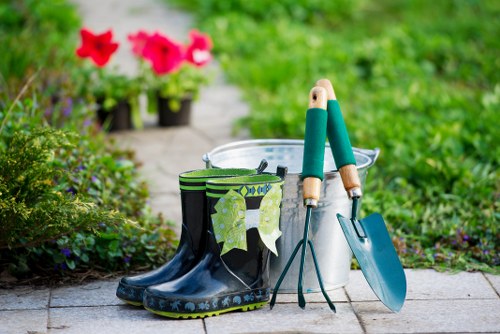Landscaping in Stump Removal

Stump removal is a crucial aspect of maintaining a beautiful and healthy landscape. Whether you’re aiming to enhance the aesthetic appeal of your garden or preparing for new landscaping projects, removing tree stumps can make a significant difference. This comprehensive guide explores the various methods of stump removal, the benefits it brings to your landscaping efforts, and essential tips to ensure a seamless process.
Understanding the intricacies of stump removal can help homeowners make informed decisions that align with their landscaping goals. From manual extraction to professional grinding services, each method has its unique advantages and considerations. This article delves into these techniques, providing you with the knowledge necessary to choose the best approach for your specific needs.
Moreover, effective stump removal not only improves the visual appeal of your property but also prevents potential hazards and promotes the healthy growth of your garden. By addressing stump issues promptly, you can avoid complications such as pest infestations, root decay, and unwanted vegetation growth.
Understanding Stump Removal

Stump removal involves eliminating the remains of a tree after it has been cut down. This process goes beyond merely cutting the tree; it requires the complete extraction or degradation of the stump and its root system. Effective stump removal ensures that no remnants are left to interfere with your landscaping plans.
There are several reasons why stump removal might be necessary. Besides aesthetic improvements, removing stumps can prevent the spread of diseases and pests that may harm other plants in your garden. Additionally, stumps can be trip hazards and can complicate future landscaping projects, such as planting new trees or installing pathways.
Stump removal can be categorized into different methods based on the tools and techniques employed. The most common methods include manual removal, chemical treatments, and mechanical grinding. Each method varies in terms of cost, effort, and effectiveness, making it important to assess your specific situation before deciding on the best approach.
Manual Removal

Manual removal involves physically extracting the stump using tools such as axes, saws, and digging equipment. This method is labor-intensive and typically requires the use of heavy machinery for larger stumps. Despite its demanding nature, manual removal is highly effective in completely eliminating the stump and its roots.
This approach is best suited for properties with ample space and access to the necessary tools. It allows for precise removal, ensuring that the surrounding area remains undisturbed. However, the extensive labor and time required make it less feasible for homeowners who prefer a less hands-on approach.
Manual removal also presents risks, such as potential injury from using sharp tools and the physical strain involved. Therefore, it is often recommended to hire professional services if you opt for this method, ensuring both safety and efficiency.
Chemical Removal

Chemical removal involves applying specialized substances to accelerate the decomposition of the stump. These chemicals break down the wood fibers, making it easier to remove the stump with minimal effort. This method is less labor-intensive compared to manual removal but requires patience, as the process can take several weeks or even months.
The primary advantage of chemical removal is its ease and minimal disruption to the surrounding landscape. It is an ideal choice for homeowners who prefer a natural and low-maintenance approach. Additionally, this method is environmentally friendly when using approved stump removal chemicals.
However, chemical removal may not be suitable for all types of soil or stump conditions. It’s essential to follow the manufacturer’s instructions carefully to ensure effective results and to avoid any potential harm to nearby plants or water sources.
Grinding Stumps

Stump grinding is a popular modern method that uses specialized machinery to pulverize the stump into small wood chips. This technique is faster and more efficient than both manual and chemical removal methods. Grinding stumps leaves the ground level, making it ready for immediate landscaping activities.
This method is highly effective for larger stumps and is often preferred by professional landscapers due to its speed and precision. The resulting wood chips can be repurposed as mulch, contributing to the overall health of your garden by retaining moisture and suppressing weeds.
While stump grinding is efficient, it does require access to the necessary machinery, which is typically provided by professional services. Additionally, the initial cost may be higher compared to other methods, but the long-term benefits often justify the investment.
Importance of Stump Removal in Landscaping

Removing tree stumps is a fundamental step in landscaping, contributing to both the functionality and beauty of your outdoor spaces. A removed stump can transform the look of your garden, providing a clean canvas for new plantings and design elements.
Stump removal enhances the safety of your property by eliminating trip hazards and reducing the risk of injuries, especially in areas frequently traversed by family members and guests. It also discourages pest infestations, such as termites and beetles, that may be attracted to the decaying wood.
Furthermore, removing stumps prevents the spread of diseases that can affect other trees and plants in your garden. By addressing stump issues promptly, you ensure the overall health and vitality of your entire landscape.
Enhancing Aesthetic Appeal

Aesthetically, a cleared landscape appears more organized and inviting. Stumps can disrupt the flow and design of your garden, making it look cluttered and unkempt. Removal allows for more creative freedom in designing pathways, seating areas, and planting beds.
With the stump removed, you can implement various landscaping features such as flower beds, decorative stones, or water features, enhancing the overall visual appeal of your property. A well-maintained garden not only boosts curb appeal but also increases the value of your home.
Moreover, the absence of stumps provides space for additional trees or shrubs, contributing to the biodiversity and ecological balance of your garden. This can lead to a more vibrant and thriving outdoor environment.
Preventing Future Issues

Stumps left in the landscape can lead to numerous issues over time. As the stump decomposes, it can cause the ground to sink, leading to uneven surfaces that are not only unsightly but also difficult to navigate. This can complicate future landscaping projects and the installation of structures like decks or patios.
Additionally, decaying stumps can attract wildlife, including insects and small mammals, which may disrupt your garden and cause further damage to your plants. By removing stumps, you eliminate these potential nuisances, ensuring a peaceful and harmonious outdoor space.
Addressing stump removal proactively helps maintain the structural integrity of your landscape, preventing long-term complications and preserving the beauty and functionality of your garden.
Methods of Stump Removal

Choosing the right method for stump removal depends on various factors, including the size of the stump, the surrounding landscape, and your budget. Below, we explore the three primary methods: manual removal, chemical removal, and stump grinding.
Each method has its unique advantages and considerations, making it essential to assess your specific needs before proceeding. Understanding the pros and cons of each approach will enable you to select the most appropriate stump removal strategy for your landscaping project.
Additionally, combining different methods can sometimes yield the best results, especially for difficult-to-remove stumps. Consulting with landscaping professionals can provide valuable insights and recommendations tailored to your situation.
Manual Removal

As previously mentioned, manual removal involves physically extracting the stump using various tools. This method provides complete control over the removal process, ensuring that every part of the stump and its roots is eliminated.
The steps typically include digging around the stump to expose the root system, cutting through the roots with an axe or saw, and leveraging machinery like a winch or excavator to pull the stump out of the ground.
Manual removal is highly effective but requires significant time, effort, and expertise. It’s best suited for smaller stumps or situations where precision is paramount. Hiring professionals can streamline the process, ensuring efficient and safe removal.
Chemical Removal

Chemical removal is an eco-friendly option that accelerates the natural decomposition of the stump. By applying a stump removal chemical, typically containing potassium nitrate, you break down the wood fibers, making the stump easier to remove or allowing it to decompose naturally over time.
The process involves drilling holes into the stump and applying the chemical directly into these cavities. Once absorbed, the chemicals facilitate the breakdown of the stump’s internal structure, reducing its size and structural integrity.
This method is less invasive and does not require heavy machinery, making it suitable for residential areas and sensitive landscapes. However, it does require patience, as the decomposition process can take several seasons to complete fully.
Grinding Stumps

Stump grinding is the most efficient and popular method for stump removal today. Using specialized grinding equipment, professionals pulverize the stump into small chips, typically reducing it to a depth of several inches below the ground surface.
This method is quick, minimally disruptive, and leaves the area ready for immediate landscaping activities. The resulting wood chips can be used as mulch, providing benefits such as moisture retention and weed suppression for your garden.
Stump grinding is highly effective for larger stumps and is often the preferred choice for commercial and residential properties alike. The precision and speed of this method make it a top option for those seeking a hassle-free stump removal solution.
Choosing the Right Method for Your Landscape

Selecting the appropriate stump removal method depends on various factors, including the size and type of the stump, your budget, and the desired timeline for removal. Evaluating these aspects will help you determine the most suitable approach for your specific landscaping needs.
Consider the following when choosing a stump removal method:
- Stump Size: Larger stumps may require mechanical grinding or manual removal with heavy machinery.
- Budget: Chemical removal is often the most cost-effective, while stump grinding and manual removal can be more expensive.
- Timeframe: Grinding provides immediate results, whereas chemical methods take longer.
- Environmental Impact: Chemical removal should be approached with caution to avoid harming surrounding plants.
- Accessibility: Limited access may make manual removal challenging, favoring grinding methods.
By assessing these factors, you can make an informed decision that aligns with your landscaping goals and resource availability.
Assessing Stump Size and Type

The size and species of the tree from which the stump originates play a significant role in determining the best removal method. Hardwood stumps, for example, are denser and more challenging to remove compared to softwood stumps.
Large stumps with extensive root systems typically require more robust removal techniques, such as mechanical grinding or professional manual extraction. Knowing the characteristics of the stump will help in selecting a method that ensures complete and efficient removal.
Additionally, the age of the stump and the extent of decomposition can affect the removal process. Older, partially decomposed stumps may be easier to remove manually, while newer stumps might require more intensive treatment methods.
Budget Considerations

Budget is a crucial factor when deciding on a stump removal method. Manual removal, while effective, can be costly due to the labor and potential equipment rental required. Similarly, stump grinding services, though efficient, come with a higher price tag.
Chemical removal offers a more affordable option, especially for those who have the time to wait for the stump to decompose naturally. However, it’s essential to weigh the long-term benefits against the immediate costs to determine the best value for your investment.
Additionally, consider any potential savings from reducing future maintenance efforts and preserving the health of your broader landscape when making your budget decision.
Environmental Impact

Environmental considerations are increasingly important in landscaping decisions. Some stump removal methods, particularly chemical treatments, may have unintended consequences on the surrounding ecosystem. It’s essential to choose environmentally friendly options whenever possible.
Chemical removal should be approached with caution, ensuring that only approved and safe substances are used. Alternatively, opting for mechanical grinding minimizes chemical use, promoting a healthier garden environment.
Additionally, repurposing wood chips from stump grinding as mulch can contribute positively to your garden, enhancing soil quality and promoting plant health without introducing harmful substances.
Benefits of Professional Stump Removal

Hiring professionals for stump removal can offer numerous advantages, ensuring that the process is efficient, safe, and effective. Professional landscapers possess the expertise and equipment necessary to handle stumps of all sizes and complexities, providing peace of mind to homeowners.
Professional services often include a comprehensive assessment of the stump and surrounding area, allowing for a tailored removal approach that aligns with your specific landscaping needs. This ensures optimal results without compromising the integrity of your garden.
Additionally, professionals can complete the removal process more quickly and with less disruption to your daily activities, allowing you to enjoy your enhanced landscape sooner.
Expertise and Experience

Professional stump removal services bring valuable expertise and experience to the table. They are trained to handle various stump removal methods safely and effectively, minimizing the risk of damage to your property and ensuring thorough removal.
With their specialized knowledge, professionals can identify the most suitable removal method for your specific situation, optimizing both efficiency and cost-effectiveness. Their experience also allows them to anticipate and mitigate potential challenges that may arise during the removal process.
Moreover, professionals stay updated on the latest techniques and best practices in the industry, ensuring that your stump removal is handled with the highest standards of quality and care.
Time and Efficiency

Stump removal can be a time-consuming and labor-intensive task, especially for large or stubborn stumps. Professional services streamline the process, utilizing specialized equipment and efficient techniques to complete the job swiftly.
This allows you to save valuable time and effort, redirecting your focus to other important aspects of your landscaping project. Additionally, the speed and efficiency of professional services ensure minimal disruption to your daily routine and garden activities.
By relying on professionals, homeowners can achieve timely and effective stump removal, ensuring that their landscaping projects proceed smoothly and on schedule.
Landscaping Ideas Post Stump Removal

Once the stump has been successfully removed, the cleared space opens up a myriad of possibilities for enhancing your landscape. From creating vibrant flower beds to installing functional patios, the post-removal area can be transformed into a focal point of your garden.
Here are some inspiring landscaping ideas to consider after stump removal:
- Planting a New Tree or Shrub: Replace the removed tree with a new species that better fits your current landscape design and ecological needs.
- Installing a Flower Bed: Use the space to plant colorful flowers, creating a visually appealing and inviting area in your garden.
- Creating a Garden Pathway: Design a pathway that guides visitors through your garden, enhancing both functionality and aesthetics.
- Building a Seating Area: Incorporate a bench or a small patio, providing a serene spot to relax and enjoy your outdoor space.
- Adding a Water Feature: Introduce a fountain or a pond, adding a soothing auditory element to your garden environment.
These ideas not only maximize the utility of your landscape but also contribute to a harmonious and balanced outdoor space.
Creating a Focal Point

Transform the cleared area into a central focal point of your garden. Installing a stunning water feature, such as a fountain or a small pond, can draw attention and create a calming atmosphere. Surrounding the focal point with vibrant plants and decorative stones further enhances the visual appeal.
A focal point serves as an anchor for your landscape design, guiding the flow of movement and creating a cohesive look. It also provides a place for relaxation and enjoyment, enriching your overall garden experience.
Consider integrating lighting elements to highlight the focal point during evening hours, adding an extra layer of beauty and functionality to your outdoor space.
Enhancing Garden Biodiversity

With the stump removed, you have the opportunity to increase the biodiversity of your garden. Planting a variety of trees, shrubs, and flowers can attract beneficial insects, birds, and other wildlife, creating a vibrant and dynamic ecosystem.
Enhancing biodiversity not only improves the health and resilience of your garden but also contributes to environmental sustainability. Diverse plant species can improve soil quality, provide natural pest control, and create a more balanced and harmonious outdoor environment.
Additionally, a biodiverse garden offers a more engaging and aesthetically pleasing space, with a wide range of colors, textures, and forms to enjoy throughout the seasons.
Preventing Future Tree Stump Issues

Effective stump removal is just the first step in maintaining a healthy and beautiful landscape. To prevent future stump issues, it’s essential to adopt proactive measures that support the overall health of your trees and garden.
Here are some strategies to help prevent future tree stump problems:
- Regular Tree Maintenance: Prune trees regularly to prevent dead or diseased branches, reducing the likelihood of tree falls and subsequent stump issues.
- Proper Tree Selection: Choose tree species that are well-suited to your local climate and soil conditions, ensuring healthy growth and reducing the risk of future removal needs.
- Implementing Effective Drainage: Ensure proper drainage around your trees to prevent root rot and other issues that can compromise tree health.
- Monitoring Tree Health: Regularly inspect your trees for signs of disease, pests, or other health issues, addressing them promptly to maintain tree vitality.
- Using Tree Protection Measures: Protect tree roots from construction and other disruptive activities to prevent damage that can lead to stump issues.
By implementing these preventive measures, you can minimize the need for future stump removals and promote a thriving and resilient landscape.
Proper Tree Care Practices

Adopting proper tree care practices is essential in preventing future stump problems. This includes ensuring that trees are planted at the correct depth, providing adequate water and nutrients, and protecting them from environmental stressors such as extreme weather conditions and pest infestations.
Regularly fertilizing and mulching your trees can promote healthy growth and strengthen their resilience against diseases and pests. Additionally, avoiding over-pruning or improper pruning techniques can prevent structural weaknesses that may lead to tree falls and the eventual need for stump removal.
Healthy trees are less likely to develop issues that necessitate their removal, ensuring a long-lasting and beautiful landscape.
Strategic Planting

Strategic planting involves selecting the right tree species for your landscape and positioning them appropriately to maximize their growth potential and minimize future problems. Consider factors such as sunlight, soil type, and available space when choosing and placing trees.
Avoid planting trees too close to structures, drainage systems, or other trees to prevent root competition and potential damage. Proper spacing allows trees to grow unhindered, reducing the likelihood of diseases and the need for future removals.
Additionally, incorporating a diverse range of tree species can enhance the biodiversity of your garden, contributing to a more resilient and vibrant landscape.
Conclusion

Stump removal is a vital component of effective landscaping, offering numerous benefits from enhanced aesthetic appeal to improved safety and plant health. By understanding the various methods of stump removal and their respective advantages, homeowners can make informed decisions that align with their landscaping goals.
Whether you choose manual removal, chemical treatments, or stump grinding, each method offers unique benefits tailored to different needs and circumstances. Additionally, considering factors such as budget, environmental impact, and long-term landscape plans can help you select the most appropriate removal strategy.
Investing in professional stump removal services can further ensure efficient and effective results, allowing you to enjoy a beautiful and well-maintained landscape. With the stump out of the way, new landscaping opportunities abound, enabling you to create a garden that is both functional and visually stunning.
Contact us today to learn more about our stump removal services and take the first step towards transforming your landscape!